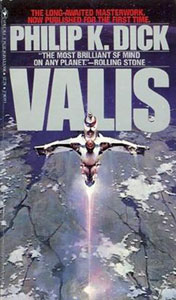Philip K. Dick reworks the themes from “Radio Free Albemuth” (written in 1976, published in 1985) in “VALIS” (1978, 1981), after “RFA” was initially nixed by his publisher. The result is a rare example of a publisher preferring a less accessible, less mainstream novel when given two options. “VALIS” is the weaker book, in my opinion, but it’s still fascinating to follow PKD on an intellectual adventure that calls to mind TV shows like “Lost” and “Westworld.”
Fat and friends
There is some physical movement through the world (mostly southern California), but mostly Horselover Fat and his friends are gathering evidence of the nature of the universe and God, then sitting on couches or restaurant booths to discuss and argue.
While it’s appropriate to call “VALIS” a novel, it’s a different kind of novel than Dick’s previous works, wherein he comes up with a wild sci-fi concept and his protagonist works his way through crazy, relatable, humorous situations. “VALIS” is a case of an author trapped in his own mind, but because PKD is hyper-aware of this, he hasn’t lost his mind; while this doesn’t flow as smoothly as some of his other works, it’s still very readable.

“VALIS” (1981)
Composition year: 1978
Author: Philip K. Dick
Genres: Science fiction, religion
Setting: Contemporary, southern California
In “RFA,” PKD alternates between two POV characters, Phil and Nicholas. Phil is a famous SF author, but he’s a lifelong bachelor. Nicholas has a wife and kid, representing the family man aspect of PKD. Dick lightly fictionalizes and splits his real-life experiences between Phil and Nick.
It seems like PKD reflected on his structure in “RFA” and decided that splitting himself into two people is a sign that he’s crazy. So in “VALIS,” he digs into this more: We have Phil (who tells this tale in the first person) and Horselover Fat. PKD tips us off early that they are the same person, so it’s not like the end of “The Sixth Sense” where it hits us that “Wow, that person was never really there!”
When a trusted guru tells Phil that Horselover Fat is Phil, Phil accepts it, and his friends – David, a Christian, and Kevin, an agnostic – are happy that Phil is sane again. If there’s ever a film adaptation of “VALIS,” it will be interesting to see how it portrays Phil being split into two people.
Reworking what became ‘Radio Free Albemuth’
As it plays in book form, it’s easy to follow because we don’t need to know exactly how Phil’s behavior appears to David and Kevin. Is Phil having an audible conversation with himself, or is the back-and-forth happening in his mind? That’s the beauty of books – they can get away with “close enough” where movies can’t.
Very loosely speaking, the events of “Radio Free Albemuth” play out as a theatrical movie called “Valis” that Phil, Fat, David and Kevin see in “VALIS” (as if this novel wasn’t meta enough already). In real life, PKD experienced a beam of pink light bouncing off the Christian fish symbol necklace of a pharmacy delivery girl. He interpreted it as God being beamed into his brain. This happens in the movie “Valis.”
“RFA,” “Valis” and especially “VALIS” are cases of PKD working through his religious beliefs. The most pointed parts of his “Exegisis” (which was published in full in 2011) are peppered throughout the narrative when appropriate and included in an appendix. An exegisis is a list of rules derived from a person’s theories and beliefs about the nature of reality.
Collectively, “RFA,” “VALIS” and “The Exegisis of Philip K. Dick” are effectively books of a bible of PKD’s personal religion, sometimes labeled by scholars as his personal brand of “Gnostic Christianity.” “RFA” is a sober narrative about God (in the form of VALIS and its flock) taking on the Adversary (in the form of evil governments). But “VALIS” is about the author’s internal conflict between whether he is 1) a rare person who has discovered the true structure of the universe and the meaning behind everything, or 2) insane.
Mostly, he leans toward Option No. 1, propping it up with robust cases for all his specific beliefs, either via logical deduction or via something that literally happens to Phil, Fat or another character in their sphere.
Hedging his bets
PKD hedges his bets toward the end by having Fat emerge out of Phil yet again, and also by coming to an inconsistent conclusion about religious leaders and “Valis” filmmakers Eric and Linda Lampton. The Lamptons believe that they are truly three-eyed, crab-clawed beings from Albemuth who have taken human form on Earth.
Linda Lampton’s child, born via her union with God, is Sophia (an incarnation of Christ). This 2-year-old girl can speak as cogently as a wise adult guru. Phil (and Fat), David and Kevin observe this child in person and there’s no trickery involved. Yet Phil/Fat sticks with the theory that the Lamptons are insane, and that doesn’t fit with his willingness to latch on to other evidence of the nature of God.
I get the sense that PKD believed what he believed, but he also worried that his beliefs were proof that he was crazy. Because of that, “VALIS” isn’t strictly an argument for PKD’s religion; it’s a story of a man with a lot of thoughts in his head struggling to make sense of them. From PKD’s typewriter, the result is more entertaining than it would be from most.


